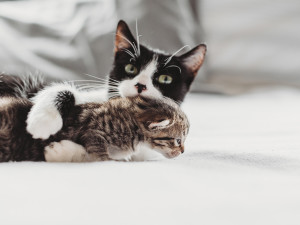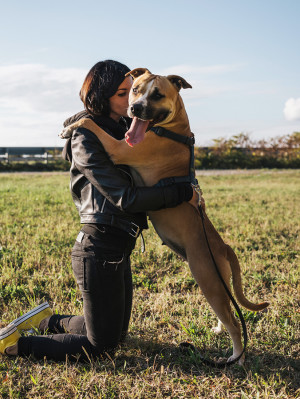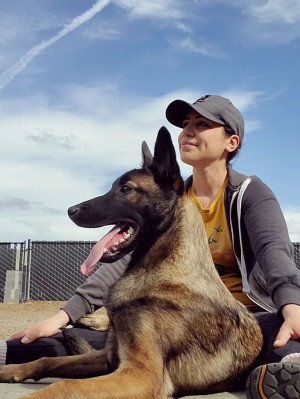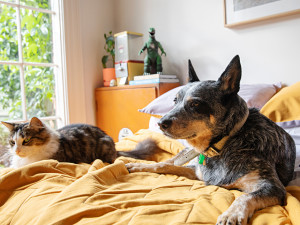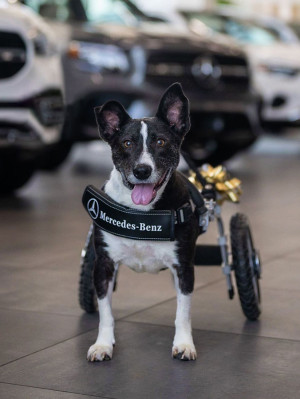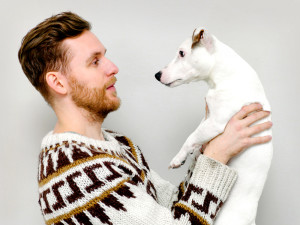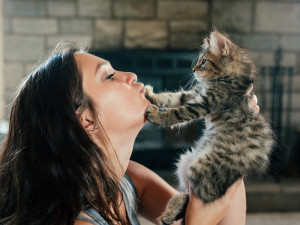Why You Should Adopt a “Less Adoptable” Dog
Here’s why you shouldn’t rule out senior dogs, special-needs pups, bully breeds, or tripods.
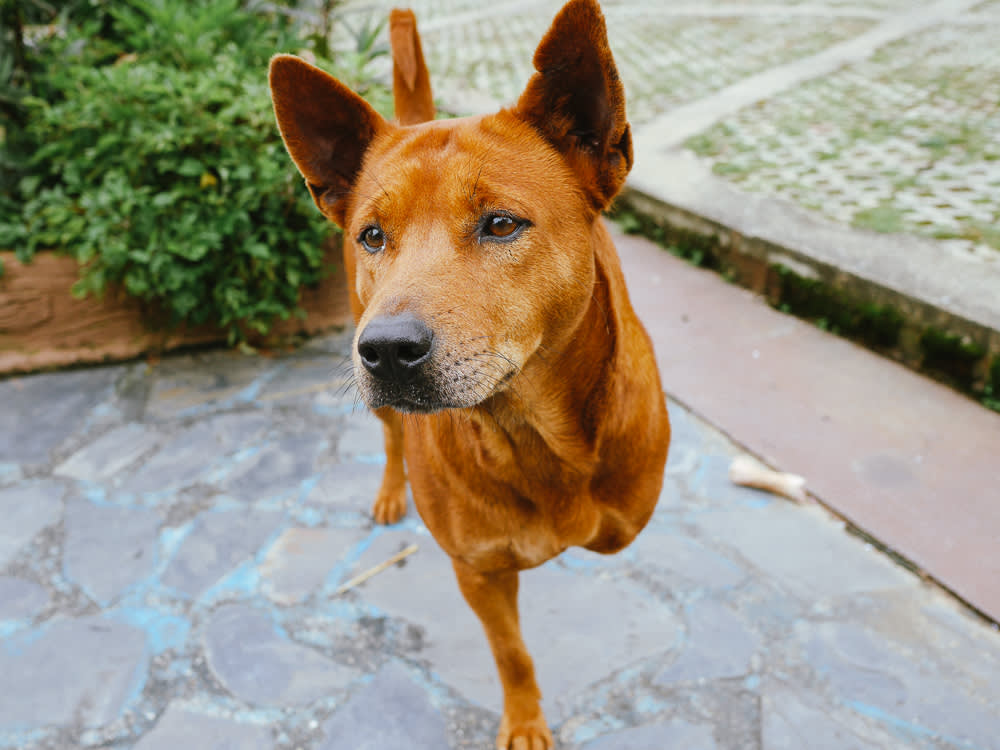
Share Article
My dog, Cleo, had a hard time getting adopted. She’s small, quiet, affectionate, house-trained — the kind of dog that normally gets scooped up quickly in a crowded New York City shelter by busy city dwellers looking for a friendly companion who falls below their apartment’s weight limit and who won’t draw noise complaints from the neighbors.
But Cleo has a cherry eye, a prolapsed tear gland on the inside corner of her left eye that looks like, well, a little cherry on her eyeball. It’s a little bit of an eyesore (no pun intended) but it doesn’t bother her and several vets assured me that it’s basically a non-issue. Still, her cherry eye scared away lots of potential adopters, shelter staff told me. Some were worried about the potential care it would entail, others just didn’t like how it looked.
Ultimately, their skepticism was my own good fortune, and because of it, I was able to bring home Cleo, who I am convinced is the most perfect creature to have ever lived (this claim has not been fact-checked). But some dogs who are considered “less adoptable” are not always so lucky. To give these pups the attention and appreciation they deserve, the third week in September was named Adopt a Less-Adoptable Pet Week. Below, a breakdown of some of the groups of dogs that sometimes have a harder time finding a home, and why it’s worth considering welcoming one into yours.
Senior dogs
Some adopters may have reservations about bringing a mature animal into their life. (What if you don’t get that much time with them? What if they develop health problems?) But, Steve Gruber, the director of communications for the Mayor’s Alliance for NYC Animalsopens in new tab, says that there are lots of reasons to consider adopting an older dog.
“I for one lean towards older animals,” Gruber says. He notes that senior dogs, or those who are about seven years old and up, often already know the basics of house training and walking on a leash, which is appealing for a lot of adopters. Gruber also says that older dogs are often (though by no means always) lower energy, which can make them the perfect companions for older adopters or people who lead less active lifestyles.
“Bully breeds”
So-called “bully breeds” (breeds that have “bull” in their name, such as Bulldogs, Bull Terriers, American Staffordshire Terriers, and American Pit Bull Terriers, aka “Pit Bulls”) have been unfairly maligned for years — especially American Pit Bull Terriers. Some buildings, neighborhoods, and even whole cities have bans against them, and they often spend a longer time in shelters than other dogs. But they are just like any other dogs in that an individual dog’s temperament is the result of its breeding, and the care and training they received growing up.
If you live somewhere where you can have one, though, “bullies” can be loving, funny, devoted companions. They’re smart, athletic, affectionate, and relatively low maintenance when it comes to grooming.
Special needs dogs
In many ways, adopting a dog with chronic health issues isn’t any different than adopting a dog without them. Although some dogs may have, say, cherry eye, or mobility issues, or require a wheelchair, or have a condition that requires daily medication and regular vet visits, in all cases, potential adopters should do their research, and be realistic about the time and money they are able to devote to their pet. Plus, once you bring a new dog into your home, you’ll have a completely new routine anyway. The routine for a dog with health issues may be slightly different, but health issues are something every pet parent will deal with at one point or another anyway.
There are also resources to help you best care for a dog with chronic health issues. In addition to online resources and communities, shelters, rescues, and foster homes will often have advice on how to take care of an individual animal, because they’ve been doing it themselves. Gruber also recommends getting pet insurance to help offset some of the costs of care (though really this is good advice for any pet parent).
Tripods
Believe it or not, tripods (dogs with three legs) are not considered special-needs pets. Whether they lost a limb due to injury or illness, most dogs get around on three legs pretty easily and can run as fast as their four-legged friends. They may not be the best choice for a multi-level home, but every dog is different and you’d be surprised how adaptable (and adoptable) tripods are. Tripawds.comopens in new tab is a great resource for anyone interested in adopting such a pup.
Black dogs
Statistically speaking, dogs with black fur are less likely to be adopted. Whether consciously or not, some people assume black dogs are more aggressive or less welcoming. A common theory suggests that this is because it’s challenging to capture their darker features without professional lighting, so as someone may be scrolling through the local shelter site, these images are quickly passed over.
Fear and stigma attached to specific breeds, plus media and pop-culture portrayals, have also played a role, contributing to the coining of “Black Dog Syndrome,” a phenomenon in which black dogs are overlooked for lighter-colored ones. Given that, February was recently deemed Black Dog Syndrome Awareness Month to help raise awareness and shift perspectives. And a few photographers, including Emma O’brienopens in new tab, have focused their lens on black dogs in photo series to how show stunning they truly are.
In the end, it’s important to remember not only that the dogs society has labeled as being “less adoptable” are capable of being wonderful pets but also that lots of people want to adopt them. As Gruber says: “With all of these animals that are perceived as being ‘difficult to adopt out,’ there are a lot of people who actually seek out these animals.” Maybe you’ll be one of them.
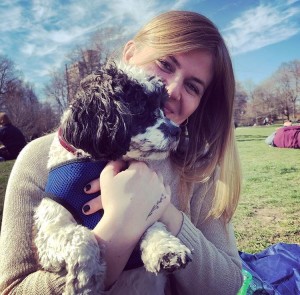
Madeleine Aggeler
Madeleine Aggeler is a freelance journalist and copywriter in Washington, D.C. Previously, she was a writer at New York magazine’s The Cut. She lives with her dog, Cleo, who works primarily as a foot warmer.
Related articles
![two bonded kittens snuggling]()
Why You Should Adopt a “Less Adoptable” Cat
Here’s why bonded kitties, senior cats, and felines with FIV make just as amazing pets as any other.
![cat and dog laying on bed together]()
What’s the Deal With Pet Insurance?
It covers your pet so you can get that broken leg fixed — while keeping your wallet happy.
![Henry Friedman and Bunny’s new/custom wheelchair from Mercedes Benz.]()
How Bunny the Dog Got the Literal Mercedes-Benz of Wheelchairs
Rescuer Henry Friedman helped a disabled dog go from abandoned on the street to rocking a designer whip.
![Woman running with her cute spotted beagle while enjoying good weather and playing together in the city.]()
How to Test the Waters of Pet Parenthood
How five aspiring pet parents are getting their feet wet by moonlighting as shelter volunteers and dog walkers.
![cute mutt / mixed breed dog]()
You Must Love Mutts on National Mutt Day
July 31 is National Mutt Day. Here are nine reasons why a mixed-breed dog would make a great new addition to your family.
![Man holding a dog in front of a light gray background]()
You’ve Adopted a Dog From a Hoarding Case. Now What?
Hundreds of dogs have been rescued from hoarding situations so far this year. Here’s what their adopters should know, according to animal welfare experts.
![A brunette woman holding a spotted gray kitten up to her face while its front paws rest on her chin]()
10 Foster-Fail Stories That Will Tempt You to Do the Same
Adopting a foster pet doesn’t isn’t always the right choice. But for these families, it turned out to be the only one.

